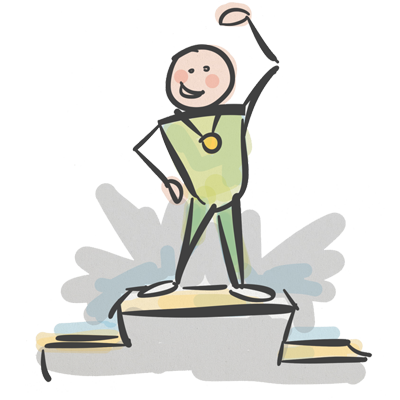
Our approach helps you understand what slows you down and affects your decision-making
With the help of activities that are designed to improve metacognitive skills and self-awareness, participants are led to reflect on their own ways of thinking and behaving on a daily basis. Slowing down and examining your own decision-making process allows you to better understand and reduce, if not eliminate, what makes you less productive day after day and what is holding back your career.
Our goal is to enable each participant to integrate new, more thoughtful and context-aware processes to develop their intellectual abilities in relation to their emotional intelligence in order to solve a problem with a minimum of time, energy and resources, with pleasure, elegance, ease and assurance.
Greater resistance to stress factors
By taking the time for introspection, individuals are better able to observe their behavior, thoughts and feelings during activities in order to develop a greater self-consciousness. This self-inquiry allows for a greater freedom of choice and greater confidence in new situations. You thus develop greater control over your decision-making process as well as your life and work skills.
The strategies taught enhance each individual’s desire to confront new challenges and expand their knowledge. By developing good habits, participants are led to consider a range of possibilities in the search for solutions. The strategies taught also aim to change habitual, automatic responses and pre-conceived perceptions of problems and teach participants to adapt to changes. Individuals come to see change not as an obstacle, but rather as an opportunity to develop and reach new heights.
Skills to develop

All the knowledge learned during the course of the training is concretely related to your needs and to your goals of creating positive change. We also pay special attention to the following skills as they allow you to become a valued resource in your organization.
Decision Making
Life and work are just a series of big and small decisions followed by corresponding actions. Good decisions are based on a mixture of data, analysis, intuition, wisdom, experience and judgment. Making good decisions requires being patient enough to gather the data available, humble enough to ask for the opinions and advice of others, and strong enough to make a firm decision. Nobody is always right. What matters is the percentage of good decisions made over a period of time.
Leadership
Leadership is defined by the ability to influence, and not simply by having a professional title. The concept is often misunderstood, more often by new managers, believing that they must exercise directive power, which puts a damper on their natural leadership and that of their team members. It is about understanding how to exercise leadership in the context of your personality, how to demonstrate integrity and personal commitment, and how to encourage each individual to work to the best of their ability.
Emotional Intelligence
Companies are composed of humans, and humans are composed of emotions. Emotions are ubiquitous in many projects and professional interactions. They are also the biggest cause of inefficiency and bad decisions. A person with highly developed emotional intelligence is much more likely to succeed. The best way to limit the damage caused by the mismanagement of emotions is to learn to recognize and accept them in an effort to develop better control over them. Listening with empathy is a skill that allows you to work better in a team and exercise better leadership.
Organisation
The ability to get organized is the basis of productivity and efficiency. In many companies, the pressure on speed and performance leads to poor management of time and resources. Learning to slow down to complete data collection, clarify objectives, break down and consolidate information, and develop alternative solutions are important habits to develop if you want to be more effective.
Priority Management
The number of communications applications available to modern businesses has made it easy to stay connected. But workers who are bombarded from all sides are easily distracted and sometimes forget the real goals on which they are evaluated. Knowing how to recognize priorities according to their importance is an essential skill that everyone needs to develop. Moreover, knowing how to differentiate the urgent from the important helps to keep the focus on organizational objectives.
Conflict Management
Most organizations are decentralized and compartmentalized, which helps to create natural conflicts between groups. The range of personalities and nationalities in many companies also makes the climate more conducive to conflict, not to mention the geographical separation of teams, internal competition and conflicts of opinion and political power. Adopting a collaborative attitude, focusing on common interests and learning to make concessions are part of the principles of “know-how” that must be advocated at every level of the organization.
